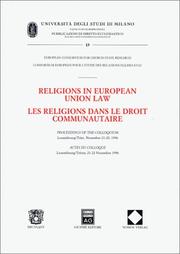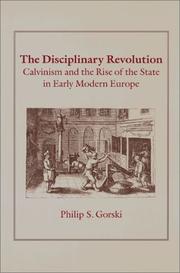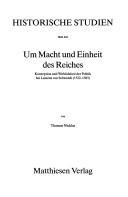| Listing 1 - 10 of 32 | << page >> |
Sort by
|
Book
ISBN: 2713217830 9782713217838 Year: 2002 Volume: 96. Publisher: Paris École des hautes études en sciences sociales
Abstract | Keywords | Export | Availability | Bookmark
 Loading...
Loading...Choose an application
- Reference Manager
- EndNote
- RefWorks (Direct export to RefWorks)
History of Europe --- anno 1500-1799 --- Religion and state --- Religion et Etat --- History --- Histoire --- Europe --- Church history --- Histoire religieuse --- Church and state --- History. --- 16th century --- 17th century --- 18th century --- Church and state - Europe - History.
Book
ISBN: 8815101756 3428115821 9788815101754 9783428115822 Year: 2004 Volume: 14 14 Publisher: Bologna Il Mulino
Abstract | Keywords | Export | Availability | Bookmark
 Loading...
Loading...Choose an application
- Reference Manager
- EndNote
- RefWorks (Direct export to RefWorks)
Politics --- History of Europe --- Mass communications --- Communication in politics --- Communication --- Church and state --- History --- Political aspects --- Communication in politics - Europe - History - Congresses --- Communication - Political aspects - Europe - History - Congresses --- Church and state - Europe - History - Congresses

ISBN: 8814071403 9788814071409 Year: 1998 Volume: 13 Publisher: Milano Giuffrè
Abstract | Keywords | Export | Availability | Bookmark
 Loading...
Loading...Choose an application
- Reference Manager
- EndNote
- RefWorks (Direct export to RefWorks)
Church and state --- Sociology of religion --- European law --- Church and state - Europe - Congresses --- Church and state - European Union countries - Congresses --- the status of religions --- community law --- national identity --- constitution --- les religions dans les états --- la religion et le droit communautaire
Book
ISBN: 1283402688 9786613402684 3110262037 3110262029 Year: 2011 Publisher: Berlin ; Boston : De Gruyter,
Abstract | Keywords | Export | Availability | Bookmark
 Loading...
Loading...Choose an application
- Reference Manager
- EndNote
- RefWorks (Direct export to RefWorks)
In medieval Europe, the death of a king could not only cause a dispute about the succession, but also a severe crisis. In times of a vacant throne particular responsibility fell to the bishops - whose general importance for the time around the first millennium has been revealed by recent scholarship - as royal counsellors and policy makers. This volume therefore concentrates on the bishops' room for manoeuvre and the patterns of episcopal power, focusing on the Eastern Frankish Reich and Anglo-Saxon England in a comparative approach which is not least based upon the research of a renowned medie
Church and state - Europe - History. --- Church and state -- Europe -- History -- Congresses. --- Church history - Middle Ages, 600-1500. --- Church history -- Middle Ages, 600-1500 -- Congresses. --- Episcopacy - History. --- Episcopacy -- History -- Congresses. --- Episcopacy --- Church and state --- Church history --- Religion --- Philosophy & Religion --- Christianity --- History --- Christianity and state --- Separation of church and state --- State and church --- Bishops --- Collegiality of bishops --- Collegiality --- State, The --- Church polity --- Apostolic succession --- Bishops. --- East Franconia. --- England. --- Power.

ISBN: 0226304841 0226304833 9780226304861 0226304868 9781283150750 1283150751 9780226304830 9780226304830 9780226304847 Year: 2003 Publisher: Chicago University of Chicago Press
Abstract | Keywords | Export | Availability | Bookmark
 Loading...
Loading...Choose an application
- Reference Manager
- EndNote
- RefWorks (Direct export to RefWorks)
What explains the rapid growth of state power in early modern Europe? While most scholars have pointed to the impact of military or capitalist revolutions, Philip S. Gorski argues instead for the importance of a disciplinary revolution unleashed by the Reformation. By refining and diffusing a variety of disciplinary techniques and strategies, such as communal surveillance, control through incarceration, and bureaucratic office-holding, Calvin and his followers created an infrastructure of religious governance and social control that served as a model for the rest of Europe-and the world.
Calvinism - Europe - History. --- Calvinism -- Europe -- History. --- Christian sociology -- Reformed Church -- History. --- Church and state - Europe - History. --- Church and state -- Europe -- History. --- Church and state -- Reformed Church -- History. --- Church and state - Reformed Church - History. --- Europe -- Church history. --- Europe - Politics and government. --- Europe -- Politics and government. --- Sociology, Christian (Reformed Church) - History. --- Christian sociology --- Church and state --- Calvinism --- Religion --- Philosophy & Religion --- Christianity --- Reformed Protestantism --- Congregationalism --- Reformation --- Reformed Church --- Theology, Doctrinal --- Arminianism --- Puritans --- Zwinglianism --- Christianity and state --- Separation of church and state --- State and church --- State, The --- Christian social theory --- Social theory, Christian --- Sociology, Christian --- Sociology --- History --- Doctrines --- History. --- Europe --- Politics and government --- Church history --- Reformed Church&delete& --- Church history. --- Politics and government. --- Politics
Book
ISBN: 9780521198103 9781107536265 110753626X 9781139022729 0521198100 1107223717 1139022725 1139209124 1139213954 113921702X 1139220128 1139221841 1139223550 1280484802 9786613579782 Year: 2012 Publisher: Cambridge Cambridge University Press
Abstract | Keywords | Export | Availability | Bookmark
 Loading...
Loading...Choose an application
- Reference Manager
- EndNote
- RefWorks (Direct export to RefWorks)
The return of religion to the public sphere raises various dilemmas. Rights and values, pluralism and identity, justice and efficacy, autonomy and tradition, and integration and toleration cannot always be balanced without the loss of something valuable. This volume of essays tackles such dilemmas from two perspectives. To begin, major contemporary theorists rethink the place of religion in the public sphere from republican, liberal and critical-theoretical viewpoints. Contributors then bring together theory and practice to better conceptualize and assess the latest developments in European jurisprudence with respect to religion.
Human rights --- Philosophy and psychology of culture --- Freedom of religion --- Religion and law --- Church and state --- Religion and sociology --- Law --- Law and religion --- Religion and society --- Religious sociology --- Society and religion --- Sociology, Religious --- Sociology and religion --- Sociology of religion --- Sociology --- Europe. --- Religious aspects --- LAW / International. --- Law / international. --- Europe --- Freedom of religion - Europe --- Religion and law - Europe --- Church and state - Europe --- General and Others
Book
ISBN: 2868479944 2753523959 9782868479945 Year: 2004 Volume: *38 Publisher: Presses universitaires de Rennes
Abstract | Keywords | Export | Availability | Bookmark
 Loading...
Loading...Choose an application
- Reference Manager
- EndNote
- RefWorks (Direct export to RefWorks)
La France est le seul pays d’Europe où l’État et les Églises sont le plus strictement séparés depuis la loi de 1905. Si on fait de cette loi la lointaine conséquence des rapports tumultueux entre l’Église catholique et la Révolution française, on oublie trop que, dès la seconde moitié du xviiie siècle, la France fut le pays où l’influence du clergé sur la population s’effrita, diminua et parfois s’évanouit. Cela tint au mouvement de la société qui conduisit une partie de la bourgeoisie à refuser la place seconde que lui fixait l’Église dans le corps social, aux frictions entre le clergé et les masses paysannes dans certaines régions, au discrédit de l’Église, effet de sa lutte interne entre jansénistes et anti-jansénistes menée sous l’œil goguenard des philosophes. Sur tous les fronts de combat un personnage nouveau entra en scène, qui concurrença le prêtre dans son rôle de guide des consciences : l’avocat. Les luttes politiques de la fin de l’Ancien Régime firent de lui le porte-parole des mécontents, traduisant leurs griefs et leurs revendications en termes politiques. À la veille de la Révolution, la croyance religieuse commençait à se transformer en opinion privée. Dans les autres pays de l’Europe catholique, on assista à un processus inverse. Le choix obligé fait par les souverains absolutistes éclairés de transformer le fonctionnement de l’État mais sans envisager jamais de toucher à l’ordre social, leur incapacité à améliorer les conditions de vie du plus grand nombre tout en agressant leurs croyances et leurs pratiques, entraîna la constitution d’un front du refus unissant les groupes sociaux les plus divers et aux intérêts matériels souvent antagonistes. Le clergé en fut l’organisateur et porte-parole naturel et renforça son magistère spirituel. L’Absolutisme éclairé fut un échec. C’est sur ce même front du refus que devait se construire la Contre Révolution après 1789. Philippe Goujard est professeur d’Histoire moderne à l’université de Rouen où il…
Church and state --- Secularism --- Eglise et Etat --- Sécularisation --- Catholic Church --- History --- Eglise catholique --- Histoire --- European history --- Catholic religion --- 18th century --- Religion --- Philosophy & Religion --- Christianity --- 27 "17" --- Kerkgeschiedenis--18e eeuw. Periode 1700-1799 --- Sécularisation --- Church and state - Catholic Church - History - 18th century --- Church and state - Europe - History - 18th century --- Secularism - Europe - History - 18th century --- XVIIIe siècle --- histoire des institutions --- Église catholique --- histoire des religions
Book
ISBN: 9783110262025 3110262029 Year: 2011 Volume: 6 6 Publisher: Berlin ; New York Walter de Gruyter
Abstract | Keywords | Export | Availability | Bookmark
 Loading...
Loading...Choose an application
- Reference Manager
- EndNote
- RefWorks (Direct export to RefWorks)
Episcopacy --- Church and state --- Church history --- Episcopat --- Eglise et Etat --- Eglise --- History --- Congresses. --- Histoire --- Congrès --- Congrès --- Bishops --- Collegiality of bishops --- Church polity --- Apostolic succession --- Christianity and state --- Separation of church and state --- State and church --- State, The --- Collegiality --- Episcopacy - History - Congresses --- Church and state - Europe - History - Congresses --- Church history - Middle Ages, 600-1500 - Congresses
Book
ISBN: 8843023772 9788843023776 Year: 2002 Volume: 7. Publisher: Roma Carocci
Abstract | Keywords | Export | Availability | Bookmark
 Loading...
Loading...Choose an application
- Reference Manager
- EndNote
- RefWorks (Direct export to RefWorks)
Christian saints --- Christian hagiography --- Saints chrétiens --- Hagiographie chrétienne --- Cult --- Congresses. --- Culte --- Congrès --- Christianity and politics --- Saints --- Church and state --- History --- Europe --- Church history --- Saints chrétiens --- Hagiographie chrétienne --- Congrès --- Canonization --- Hagiography, Christian --- Hagiography --- Saints - Cult - Europe --- Church and state - Europe - History --- Recueils hagiographiques --- Europe - Church history

ISBN: 3786814422 9783786814429 Year: 1995 Volume: Heft 442. Publisher: Husum Matthiesen
Abstract | Keywords | Export | Availability | Bookmark
 Loading...
Loading...Choose an application
- Reference Manager
- EndNote
- RefWorks (Direct export to RefWorks)
Statesmen --- Church and state --- Hommes d'Etat --- Eglise et Etat --- Biography. --- Biographies --- Schwendi, Lazarus von, --- Holy Roman Empire --- Saint Empire romain germanique --- History --- Histoire --- -Statesmen --- -Public officers --- Christianity and state --- Separation of church and state --- State and church --- State, The --- Biography --- Schwendi, Lazarus von --- -History --- -Church and state --- -Biography --- Von Schwendi, Lazarus, --- Schvendius, Lazarus --- Statesmen - Germany - Biography. --- Church and state - Europe.
| Listing 1 - 10 of 32 | << page >> |
Sort by
|

 Search
Search Feedback
Feedback About UniCat
About UniCat  Help
Help News
News